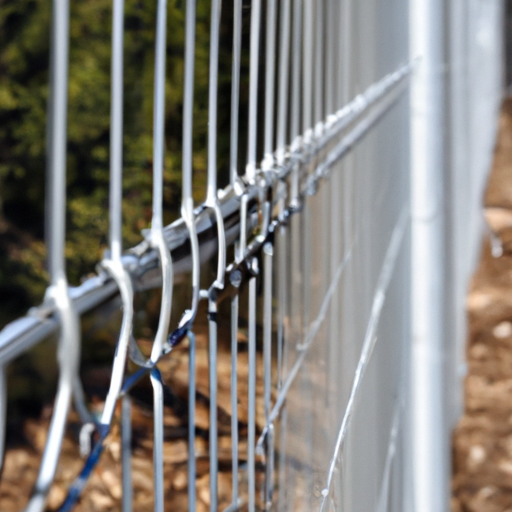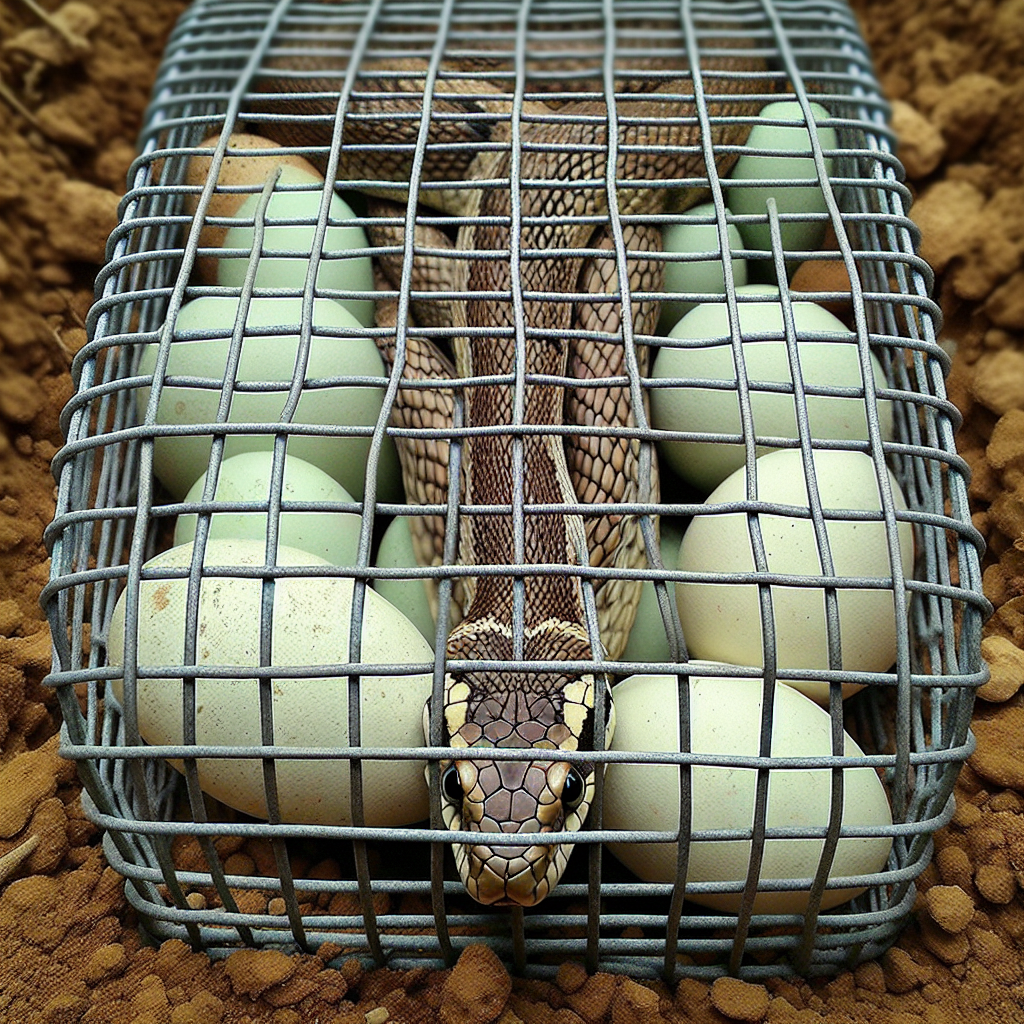You love spending time in your beautifully landscaped garden, but lately, you’ve noticed some unwanted visitors wreaking havoc on your plants and lawn. Digging predators like foxes and raccoons have become a nuisance, and you’re determined to find ways to prevent them from causing any more damage. In this article, we will explore effective measures that can be taken to keep these mischievous creatures at bay, allowing you to enjoy your outdoor space in peace.
Secure the Perimeter
Install a fence
One of the most effective ways to prevent digging predators like foxes or raccoons from accessing your property is by installing a sturdy fence. A fence acts as a physical barrier, creating a boundary between your property and the outside world. When selecting a fence, it’s essential to choose one that is tall enough to deter predators from jumping over it. Additionally, opt for a fence with narrow gaps or solid panels to prevent predators from squeezing through.
Bury the fence
To further enhance the security of your fence, consider burying it. Dig a trench around the perimeter of the fence, ensuring it is at least one to two feet deep. Burying the fence prevents predators from burrowing underneath and gaining access to your property. Make sure the buried part of the fence extends inwards for maximum effectiveness.
Add an electric wire
For an added layer of protection, consider installing an electric wire near the bottom of your fence. This deterrent method delivers a harmless but unpleasant shock to predators that come into contact with it. The shock serves as a deterrent, discouraging predators from attempting to dig under the fence. Always follow safety guidelines and consult professionals when installing electric wires to avoid any harm.
Use dig-proof materials
When constructing or reinforcing your fence, opt for dig-proof materials to make it more resilient against digging predators. Some materials that are commonly used for this purpose include concrete, galvanized steel, or even thick gauge wire mesh. These materials are harder to chew through or dig under, making it more challenging for predators like foxes or raccoons to breach your perimeter.
Remove Attractants
Secure garbage cans
Properly securing your garbage cans is vital in deterring digging predators. Ensure that they have tight-fitting lids to prevent predators from accessing the contents. Consider using a bungee cord or locking mechanism to further secure the lids. Additionally, store your garbage cans in a secure area such as a shed or garage until trash collection day.
Eliminate food sources
Digging predators are often attracted to properties with readily available food sources. By eliminating these food sources, you can significantly reduce the chances of attracting them. Clear away any fallen fruits, as they can be a tempting feast for raccoons or foxes. Avoid leaving pet food outdoors overnight and promptly clean up any spilled bird feed or compost that may attract these predators.
Cover compost piles
If you have a compost pile, it’s crucial to cover it properly to prevent digging predators from being attracted to it. Use a secure bin or container with a tight-fitting lid to keep the compost contained and inaccessible to raccoons or foxes. Avoid composting meat or animal products, as their scent can lure predators.
Remove fallen fruits
Another measure to prevent digging predators is to remove fallen fruits from your property regularly. Fallen fruits can serve as an easy and tempting food source for raccoons or foxes. By promptly removing fallen fruits, you eliminate this attractant and reduce the likelihood of predators being drawn to your property.
Keep Pets Indoors
Build a secure enclosure
If you have pets, particularly cats or small dogs, keeping them indoors or in a secure enclosure is vital for their safety and for preventing encounters with digging predators. Consider building a secure outdoor enclosure or catio where your pets can enjoy the outdoors safely. Ensure that the enclosure has a solid barrier, including a roof, to prevent predators from gaining access.
Supervise outdoor time
If your pets enjoy spending time outside, it’s important to supervise them to prevent encounters with digging predators like foxes or raccoons. Keep an eye on your pets while they are outside, especially during periods when predators are more active, such as dawn and dusk. Supervision reduces the chances of your pets wandering off or attracting the attention of predators.
Secure cat doors and dog flaps
If you have cat doors or dog flaps installed in your home, it’s essential to ensure they are secure and predator-proof. Digging predators can exploit these access points, so consider using electronic or magnetic pet doors that only open for your specific pets. These types of doors restrict access to unwanted visitors, preventing raccoons or foxes from entering your home.
Implement Deterrents
Use motion-activated sprinklers or lights
Motion-activated sprinklers or lights can be highly effective deterrents for digging predators. When these devices detect movement, they activate a burst of water or trigger bright lights, scaring off raccoons or foxes. Place these deterrents strategically in areas where predators are likely to access your property, such as near fences or around garbage cans.
Install predator decoys
Another method to deter digging predators is by installing predator decoys. These decoys mimic natural predators such as owls or coyotes, creating the illusion that an area is already occupied. Place decoys strategically around your property, especially near vulnerable areas such as chicken coops or gardens. The presence of these decoys can deter raccoons or foxes from approaching.
Apply predator repellents
Predator repellents are substances that give off strong odors or tastes that digging predators find unpleasant. These repellents can be applied to specific areas of your property, such as around garbage cans, garden beds, or the perimeter of your fence. Use repellents that are safe for the environment and follow the manufacturer’s instructions for optimal effectiveness.
Play predator sounds
Playing recorded sounds of natural predators can also deter digging predators. The sound of a coyote howl or an owl hoot can signal potential danger to raccoons or foxes, causing them to avoid the area. Consider using motion-activated devices that emit predator sounds when triggered, or play such sounds periodically to create the illusion of a predator’s presence.
Modify Landscape
Trim tree branches
Overhanging tree branches can provide easy access for digging predators to jump onto your property or access rooftops. Regularly trim trees and shrubs near your property to eliminate these potential entry points. By removing tree branches that are within close proximity to fences or buildings, you make it harder for raccoons or foxes to gain access to your property.
Remove clutter and hiding spots
Digging predators often seek out areas with ample hiding spots, such as brush piles, dense vegetation, or cluttered areas. By removing clutter and tidying up your property, you reduce the available hiding spots for raccoons or foxes. Ensure that areas around sheds, garages, and other outdoor structures are clear of any debris or materials that could attract or harbor predators.
Use ground covers
Utilizing ground covers in your landscaping can help deter digging predators. Low-lying plants such as thorny shrubs or dense ground covers act as a barrier, making it more difficult for raccoons or foxes to traverse your property. Choose plants with prickly leaves or thorns, such as roses or holly bushes, to create an unpleasant environment for potential predators.
Make deterrent plants
Certain plants have natural properties that can deter digging predators. For example, installing plants with strong scents such as lavender or marigolds can repel raccoons or foxes. Similarly, using plants with prickly or spiky leaves like cacti or holly can create an unpleasant obstacle for predators. Incorporating these deterrent plants into your landscaping can help minimize the presence of digging predators.
Utilize Traps and Removal
Live traps
If preventive measures haven’t been successful, you may consider using live traps to capture digging predators. Live traps are designed to catch animals without harming them. Once captured, you can contact local wildlife control agencies or animal rescue organizations for guidance on how to safely release the trapped animal back into its natural habitat.
Lethal traps
In situations where non-lethal methods have proven ineffective, the use of lethal traps can be considered, albeit as a last resort. Lethal traps are designed to kill the target animal quickly and humanely. It’s important to note that the use of lethal traps should comply with local laws and regulations. Always consult with professional pest control or wildlife experts to ensure proper and responsible use of lethal traps.
Professional pest control
If you’re facing persistent issues with digging predators like raccoons or foxes, it may be necessary to seek the assistance of professional pest control services. Professional pest control companies have the knowledge, expertise, and tools required to effectively manage and remove unwanted predators from your property. They can assess the situation, provide tailored solutions, and help implement long-term strategies to prevent future infestations.
Humane wildlife control services
For those looking for humane alternatives to dealing with digging predators, consider reaching out to humane wildlife control services. These organizations specialize in resolving human-wildlife conflicts through ethical and compassionate methods. They employ non-lethal techniques to deter or capture predators, ensuring their safe release or relocation to more suitable habitats.
Implement Scare Tactics
Reflective objects
Using reflective objects can be an effective way to scare off digging predators. The flash of light reflecting off surfaces like mirrors, metallic ornaments, or aluminum foil can startle and deter raccoons or foxes. Place these objects strategically around your property, focusing on vulnerable areas such as gardens or garbage cans.
Old CDs or aluminum foil
Hanging old CDs or strips of aluminum foil in areas frequented by digging predators can create visual deterrents. The movement and reflective surfaces of these objects mimic the presence of a predator, causing raccoons or foxes to hesitate and avoid the area. Regularly reposition or replace them to maintain their effectiveness.
Scare balloons or fake owls
Scare balloons or fake owls are popular scare tactics that replicate the presence of natural predators. These visual deterrents can be effective in deterring digging predators during daylight hours. Place scare balloons or fake owls in areas where raccoons or foxes are likely to explore, such as near garden beds or around poultry enclosures.
Activated lights or radios
Using activated lights or radios at night can create the illusion of human activity, discouraging digging predators from approaching your property. Install motion-activated lights around high-risk areas or consider using timers to simulate household activity when you’re away. Similarly, leaving a radio playing at low volume can help create the impression of presence and deter raccoons or foxes.
Educate the Community
Organize workshops
Organizing workshops or information sessions on preventing encounters with digging predators can be an excellent way to educate the community. These workshops can cover various topics such as identifying signs of digging predators, implementing preventive measures, and promoting coexistence with wildlife. Encourage community members to attend to gain valuable knowledge and skills.
Create awareness campaigns
Raising awareness about the importance of preventing encounters with digging predators is crucial to ensure community involvement. Create and promote awareness campaigns through various channels, such as social media, local newspapers, or community bulletin boards. Share informative content, tips, and success stories to inspire others to take action in protecting their properties from these predators.
Distribute information pamphlets
Producing and distributing information pamphlets can help disseminate valuable information to community members. These pamphlets can be shared at community centers, local businesses, veterinary clinics, or during community events. Include practical tips, preventive measures, and contact details of wildlife experts or organizations that can provide further guidance.
Collaborate with local authorities
Collaborating with local authorities, such as animal control agencies or environmental conservation departments, can enhance community outreach efforts. Partnering with these organizations allows for access to resources, expertise, and official support. Together, you can create impactful initiatives to educate the community and foster a harmonious coexistence with wildlife.
Encourage Natural Predators
Attract birds of prey
Birds of prey, such as owls and hawks, can act as natural predators of digging pests like raccoons or foxes. Encourage the presence of these beneficial birds by providing suitable nesting spots or installing nesting boxes in your yard. Research the specific requirements of local bird species and create a welcoming habitat that attracts these predators.
Create habitat for predators
Enhancing the natural habitat for predators can help maintain a healthy ecological balance and deter digging predators. Provide native plants, shrubs, or trees that offer food sources and shelter for predator species. Create habitats such as rock piles or brush piles that attract small prey animals, which, in turn, attract predators like foxes or raccoons. Consult with local wildlife experts for guidance on promoting predator-friendly environments.
Install nesting boxes or perches
Installing nesting boxes or perches for predator birds can encourage their presence and provide them with suitable roosting sites. Place these structures strategically around your property, ensuring they are secure and positioned to attract the desired predators. Research the specific nesting requirements and preferences of the predator species in your area to maximize their effectiveness.
Seek Professional Advice
Consult wildlife experts
When facing persistent issues with digging predators, seeking advice from wildlife experts is highly recommended. These experts possess in-depth knowledge on the behavior and habits of different predator species. They can provide valuable insights, recommend specific preventive measures, and guide you in effectively addressing the situation without causing harm to the predators or the surrounding ecosystem.
Contact animal control agencies
Animal control agencies or departments are well-versed in dealing with wildlife-related issues. If you’re unsure how to handle a situation involving digging predators or need assistance, contact your local animal control agency. They can provide guidance, answer your questions, and may offer services such as trap rentals or wildlife relocation programs.
Hire professional exterminators
In cases where the presence of digging predators poses a significant threat or risk to you or your property, it may be necessary to hire professional exterminators. These professionals specialize in wildlife management and removal, ensuring the safe and effective elimination of problematic predators. Research and select reputable exterminators who prioritize humane and responsible methods.
Connect with local animal rescue organizations
Local animal rescue organizations often work closely with wildlife rehabilitators and have the resources to address human-wildlife conflicts. Reach out to these organizations if you require assistance with capturing or relocating digging predators. They can provide guidance, coordinate rescue efforts, and ensure the well-being of both the predators and your community.
By implementing a combination of preventive measures, deterrents, and responsible management strategies, you can significantly reduce the attraction and impact of digging predators like foxes or raccoons. Take proactive steps to secure your perimeter, eliminate attractants, and create an environment that encourages natural predator-prey relationships. With proper education, collaboration with the community, and professional guidance, you can successfully prevent encounters and promote harmony between humans and wildlife.




